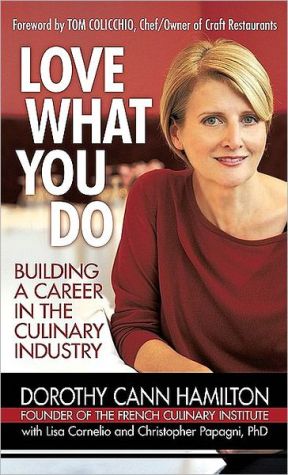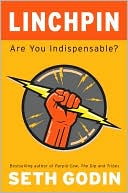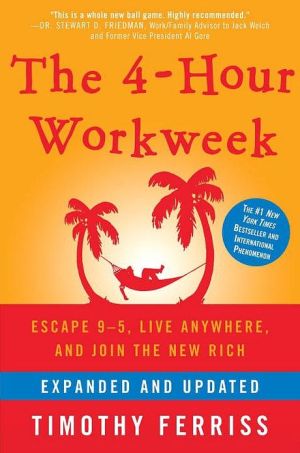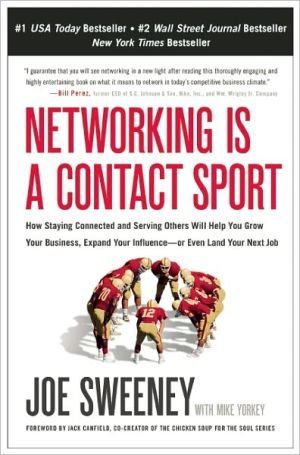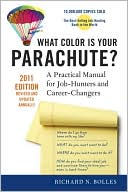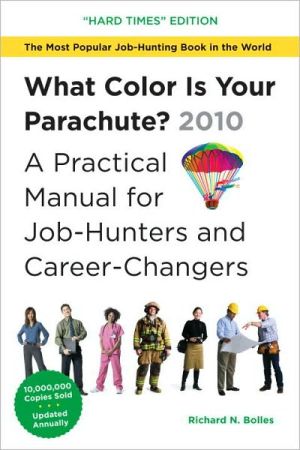Love What You Do: Building a Career in the Culinary Industry
Starting or changing careers can be an intimidating process. For those seeking their first job, there is much to learn, while career changers may face doubts about their options or obstacles in pursuing their dream. LOVE WHAT YOU DO demystifies the career decision process and guides readers through the steps of any job hunt. It also helps people prepare for, and find, careers of all kinds in the culinary world.\ \ LOVE WHAT YOU DO begins with DECIDING, where we ask readers to do a...
Search in google:
Starting or changing careers can be an intimidating process. For those seeking their first job, there is much to learn, while career changers may face doubts about their options or obstacles in pursuing their dream. LOVE WHAT YOU DO demystifies the career decision process and guides readers through the steps of any job hunt. It also helps people prepare for, and find, careers of all kinds in the culinary world.
LOVE WHAT YOU DO\ BUILDING A CAREER IN THE CULINARY INDUSTRY \ \ By DOROTHY CANN HAMILTON \ iUniverse, Inc.\ Copyright © 2009 Dorothy Cann Hamilton with Lisa Cornelio and Christopher Papagni, PhD.\ All right reserved.\ ISBN: 978-1-4401-5670-0 \ \ \ Chapter One\ DECIDING\ Change Happens\ Change. Sometimes we choose it. Sometimes it chooses us.\ The most important thing is how we respond to change. Do we crawl into bed and hide, or are we galvanized by the chance to improve our lives?\ Maybe you're reading this in bed, and even if you are, you've taken the essential first step: responding. And since knowledge is power, you're on your way to strengthening your job search.\ If you've decided to make a change in your life, you may feel more optimistic and empowered than if you've been forced to change. But that optimism is within your control: from this point on, you can choose to remain positive. Surviving change has a great deal to do with your mental attitude.\ You must also be able to live with uncertainty. It may take weeks, months, or even years before you are comfortable with your new path. Understand, however, that as long as you are working toward concrete goals, you need patience and perseverance.\ Your goals can be as simple as greater job satisfaction, higher pay, more favorable working conditions, or increased creative expression. When things get tough, keep your goals in mind. Perhaps yourvery first step should be to weigh the benefits against the sacrifices the change will entail.\ FACT: The average culinary professional spends nine to eleven hours a day at work.\ "My initial impulse toward joining the culinary industry was both exciting and terrifying! I am a career switcher and it was like sky diving; you never can be positive of the outcome. I remember talking about making the decision for a year before even taking a step. It took months for me to officially make it happen. I am so glad I did." -culinary student\ "My career has evolved over twelve years within the banking industry, a natural choice given my mathematical background. I have progressed from a statistical analyst to equity derivatives trading. While the financial payoff has always been a strong reason to continue, I feel I am now in the position to value the importance of following my passion over simply maximizing my bank balance!" -culinary student\ "If we don't change, we don't grow. If we don't grow, we are not really living." -Gail Sheehy, author of Passages\ EXERCISE: Write a list of pros and cons that encompasses all of the positives and negatives involved in realizing your goals. ____________________________________________________________________ ____________________________________________________________________ ____________________________________________________________________ ____________________________________________________________________\ A DAY IN THE LIFE\ Rob Bleifer, Executive Chef, Food Network\ Well, the good/bad news is that there is no typical day, week, month, or even year here at the Food Network. But, here's the week I am just coming off as I was asked to write this:\ I left New York City on Sunday to head to Cincinnati to oversee a dinner for our parent company for 1,100 guests. Meanwhile back in our main studio, we were in the midst of shooting a show. I often have to head out to oversee locations while we're shooting, but this was a little trickier, as my team was working fourteen-hour days and there had been a small fire on set that put a rather abrupt end to taping on Friday. (In my thirteen-plus years here, there had never been an actual fire other than the occasional pot or pan igniting.)\ The good news is that the rest of the shoot went well and they finished on schedule Tuesday night. At about the same time the shoot ended, we had just plated the last course of the dinner. But there was no time for me to relax, as I had to start really studying for the on-camera Web demos I would be doing on Thursday. I headed straight from the airport to the studio Wednesday afternoon to get a good look at the food I would be working with. Fortunately, I got a half-decent night's sleep before getting here first thing Thursday morning to start shooting. The shoot finished early and the producers seemed quite thrilled.\ Now that brings us to today, Friday, one of the rare days with nothing booked in either the studio or the kitchen. My team had some fun with the leftovers from the week and made an inspired staff meal. I had the chance to catch up on paperwork, billing, and menu planning.\ As for next week ...\ Smart Moves\ Choreographing a Career Change\ We're all aware of how tough the economy is right now and that it's likely to remain difficult for some time. That said, there are still jobs available-people leave positions, retire, die-which means that there will always be openings, regardless of the economic climate.\ The only difference is that experience and credentials are more important than ever. To survive the current economic downturn, you must be a stronger candidate than your competitors. Focus on increasing your experience and developing your credentials.\ If you're contemplating a career change, that may feel like a daunting task. You may think, "But I don't have any experience in the field I want to pursue," or "Credentials? Isn't my BA (or BS or MBA or JD) good enough?" Maybe it is. You'll only know the answer after you've been job hunting. But there's no reason not to work on several aspects of your profile simultaneously. That could include taking night classes, volunteering in your chosen field, or holding informational interviews with people working in the areas that interest you.\ In addition to considering vocational development, you may also want to consider personal development. As you begin to sift through the range of possibilities for your future, it's a good idea to do a thorough self-inventory. Asking the right questions about yourself-your likes and dislikes, your needs and responsibilities-is almost as important as asking the right questions about your next career move.\ For example, if you know that you are definitely not a morning person, then a baker's life may not be for you. Or, if you've already spent several years as an accountant, perhaps you can leverage those skills into an accounting position with a restaurant. The important thing to remember is that this is an opportunity to create the life you want.\ FACT: 42 percent of culinary professionals have changed jobs one to two times in the last five years.\ "I cooked anything I could get my hands on. Friends would joke that even people's pets weren't safe." -Patrick O'Connell, owner and chef of the Inn at Little Washington\ "I used to get a lot of flak about turning mushroom caps. It was very hard for me to make these perfect ridges on the cap with a paring knife. I went down to the grocery store and I bought two flats of mushrooms and ... I practiced until I finally figured it out. I learned something that day, and it was that for anything you learn, it takes discipline and dedication. Then you kind of tap into whatever talents you might have. But you need to push yourself to discover that talent." -Todd English, chef, restaurateur, author, entrepreneur, and television personality\ EXERCISE: Name your dream job-not what you can do, but what you want to do. Be specific. Where is it? What are the hours? What is the pay range? What are the daily responsibilities? ____________________________________________________________________ ____________________________________________________________________ ____________________________________________________________________ ____________________________________________________________________\ Now name your nightmare job. What makes it so awful? How can you take steps to avoid encountering those drawbacks in your next position? ____________________________________________________________________ ____________________________________________________________________ ____________________________________________________________________ ____________________________________________________________________\ Or: write down three ways to increase your experience and/ or develop your credentials. ____________________________________________________________________ ____________________________________________________________________ ____________________________________________________________________ ____________________________________________________________________\ REFLECTION: Is food a constant in your life, while other interests come and go? Do you feel at home in the kitchen? Is it your happy place? How much is that happiness worth to you?\ What Do I Love?\ Pinpointing Your Passions\ No doubt you're considering a culinary career because you love cooking. While many people love to cook, not all of them want to enter the food industry. So what's compelling you to become a food professional?\ Here are some solid reasons to launch a new career in food:\ I am truly happy in the kitchen. Cooking enables me to be creative and earn a living. There is a wide range of options for work within the culinary industry. My current skills translate well into a culinary position. While the culinary industry is not recession-proof, it is always full of opportunities.\ Some reasons not to go into the food industry are:\ I can make a lot of money.\ I can become a celebrity chef.\ I don't know what else to do.\ I'll prove my parents wrong.\ I'm not a people person.\ Everybody thinks I'm a good cook.\ I've failed at everything else.\ Uncovering additional passions and predilections may help you customize your career path. Perhaps you also love to be around kids. Consider working in an educational setting as an instructor, nutritionist, or chef.\ If you aren't clear about why you're pursuing a new career or which specific path is best for you, take a career assessment test. These tests highlight your strengths, point out your weaknesses, and suggest careers you may not have considered. You don't necessarily have to sacrifice one passion for another-there may be a niche you haven't thought of that suits you perfectly!\ FACT: The restaurant industry employs more than 13 million people. That number is expected to increase to nearly 15 million by 2019, according to a December 2008 news release by the National Restaurant Association.\ "Lack of experience is often the last reason people are not offered jobs." -Real Resumes for Restaurant, Food Service, & Hotel Jobs\ "My previous career was as an actor. I've worked in that industry for the last twelve years in New York City. I am very used to negative voices, obstacles, and people trying to talk me out of it. But similar to acting, this is a field where passion is so critical to your decision to go into it, your ability to endure it, and your inability to ignore it." -culinary student\ EXERCISE: What do you love about cooking? Working with your hands? Making other people happy? Write down five reasons you love it. ____________________________________________________________________ ____________________________________________________________________ ____________________________________________________________________ ____________________________________________________________________\ Now do the same with three other things you love to do. Look for patterns and connections. These are elements that should be present in whatever path you choose. ____________________________________________________________________ ____________________________________________________________________ ____________________________________________________________________ ____________________________________________________________________\ What Am I Already Good At?\ Bring Your Current Talents to the Table\ Taking stock of your existing skill set can be a valuable guide as you decide which path to follow within the food industry. Some skills will provide a clear advantage in certain fields and may also help you in less obvious ways. If you're a chef who is good with people, for example, that will be a huge asset with your co-workers and staff. It can also help you negotiate with purveyors, relate to your customers, and woo publicists.\ Don't dismiss training you've acquired in other industries. Many of the skills picked up in your previous career will be valuable in future endeavors. In fact, you should try to integrate those skills into your career plans and consider how they can help you move forward.\ Even if you've been a stay-at-home parent, you will bring many talents to your next position. The ability to multitask, prioritize, problem solve, and yes, please fussy eaters, are all elements of parenting that will enable you to thrive in the workforce.\ Recent graduates bring yet another set of skills to the table. They are usually adept at handling pressure and deadlines, well versed in juggling multiple projects, and brimming with enthusiasm and energy. Don't underestimate any of these elements when you consider your next career move.\ Finally, more tangible talents such as graphic design skills or facility with foreign languages should always be placed front and center in any job search. While you may not consider them relevant, your next employer may need exactly what you can offer!\ FACT: Executive chefs have an average of twenty years' experience and make an average of $74,869 a year while the mean annual wage of all chefs is $40,700.\ "I really believe that you're always moving in a direction in your life, and you begin to understand the direction as you move through it." -Thomas Keller, chef and owner of Per Se and The French Laundry\ "I was literally sitting at my desk at work one day when I Googled 'culinary schools.' I knew my life had to change but I was still unsure of how to do that. I was twenty-three and already burned out from an unrewarding job. However, the idea of going on to get a master's degree in something 'practical' just didn't appeal to me. I had seen a commercial the night before on the Food Network for a culinary school, but I don't think the idea of actually going through with it clicked until I saw the school's Web site. I was hooked. I talked to my parents, friends, and co-workers and was met with unconditional support and encouragement. It was like finding out my dream career was hiding out right under my nose the entire time." -culinary student\ EXERCISE: Take an honest look at your strengths and weaknesses. List them at length and in detail. Then try to describe how they might help or hurt your future endeavors. What can you do either to increase their positive impact or mitigate the negative? ____________________________________________________________________ ____________________________________________________________________ ____________________________________________________________________ ____________________________________________________________________\ A DAY IN THE LIFE\ Christine Carroll, Founding Director, CulinaryCorps\ I created CulinaryCorps to allow cooks to give back to communities in a meaningful way, but I never imagined that a service corps of culinary professionals could be such a wonderful machine to watch in action. During each week-long service trip, I am awed and amazed at how a team of volunteer cooks, working together for the first time, can so quickly put egos aside and turn out amazing dishes, often on a very large scale. Within minutes of arriving at a project site, they have stocks on the burner, dough on the rise, and mounting piles of fresh vegetables on their cutting boards. As volunteers in a grassroots organization, CulinaryCorps cooks directly nourish members of the communities they serve-including students, aid workers, and residents-who proudly stand by their homes, their food, and their way of life. Moreover, as we share our cuisine with them, they often return the favor by enthusiastically sharing their local cuisine with us. It's the most delicious twoway street you could imagine.\ My word of advice for people considering a similar career? Never underestimate the power of your culinary abilities: cooks can change the world. I've seen it with my own eyes, and it's a beautiful sight.\ What Do I Need?\ Meeting Your Bottom Line\ An honest assessment of your basic requirements is essential before you begin to think about possibilities for your future. Here's a partial list of some things to consider:\ Income: How much money do you need to make? In the first year? Second? Fifth? As a goal? Location: Where would you like to live, ideally? Where would you refuse to live? Lifestyle: How many hours a week are you comfortable working? Would you be able to work a very early or very late shift? How long a commute could you tolerate? How many days a week are you willing to work? What about vacations? Would you be okay working on holidays? Work environment: What kind of workplace would you like to be in? What would your ideal co-workers be like? Would you prefer a big establishment or a smaller one? Your routine: Consider your daily tasks. Would you prefer a great deal of responsibility or the chance to slowly build your skills by concentrating on a specific set of tasks? Would you prefer to work with high volume or individual orders?\ Some establishments present a high-pressure environment while others prepare foods in advance.\ Consider these and other variables carefully; once you have settled into a path, flexibility may be more limited.\ FACT: The average starting chef salary (one to four years in the industry) is $33,700.\ "I've never had three weeks vacation in my life-and I come from Europe, where there's eight weeks vacation. Just shutting your phone off and making sure that no one can get you is a major thing." -Marcus Samuelsson, chef and co-owner of Aquavit and youngest chef ever to receive a three-star restaurant review from The New York Times\ EXERCISE: Pick a city you would like to live in and a position you would like to hold within the next five years. Look up annual incomes for that position in that city or a similar location. (See www.acfchefs.org.) Now plot as many aspects of your living expenses as you can anticipate. Is your goal reasonable? What would you have to alter to make it work? ____________________________________________________________________ ____________________________________________________________________ ____________________________________________________________________ ____________________________________________________________________\ The Goal\ Taking Aim at the Future\ What is your primary motivation for the move you're about to make? Perhaps you've finally decided to pursue your dreams. Following your passion is empowering and can reduce your apprehension as well as give you confidence when things get tough. But it's helpful to be aware of the other reasons behind your efforts.\ (Continues...)\ \ \ \ \ Excerpted from LOVE WHAT YOU DO by DOROTHY CANN HAMILTON Copyright © 2009 by Dorothy Cann Hamilton with Lisa Cornelio and Christopher Papagni, PhD.. Excerpted by permission.\ All rights reserved. No part of this excerpt may be reproduced or reprinted without permission in writing from the publisher.\ Excerpts are provided by Dial-A-Book Inc. solely for the personal use of visitors to this web site. \ \
Contents Foreword....................ixClouds with Silver Linings....................xiiiINTRODUCTION....................xviiI. DECIDING....................1Change Happens....................3Smart Moves....................9What Do I Love?....................15What Am I Already Good At?....................21What Do I Need?....................27The Goal....................31Obstacles....................35Naysayers....................43II. TRAINING....................47First Steps....................49Getting Serious: The Prep....................55On-the-Job Training: Paid Versus Unpaid Positions....................65Skills: Learning and Improving....................71Finances....................77III. LAUNCHING....................83The Jobs....................85The Search....................97The Application....................103The Offer....................109The First Year: What to Expect....................115Entrepreneurs....................127Making a Difference....................137Resources....................145Additional Reading....................147What Can You Do with a Culinary Degree?....................151Endnotes....................159Love What You Do Biographies....................163Index....................165
